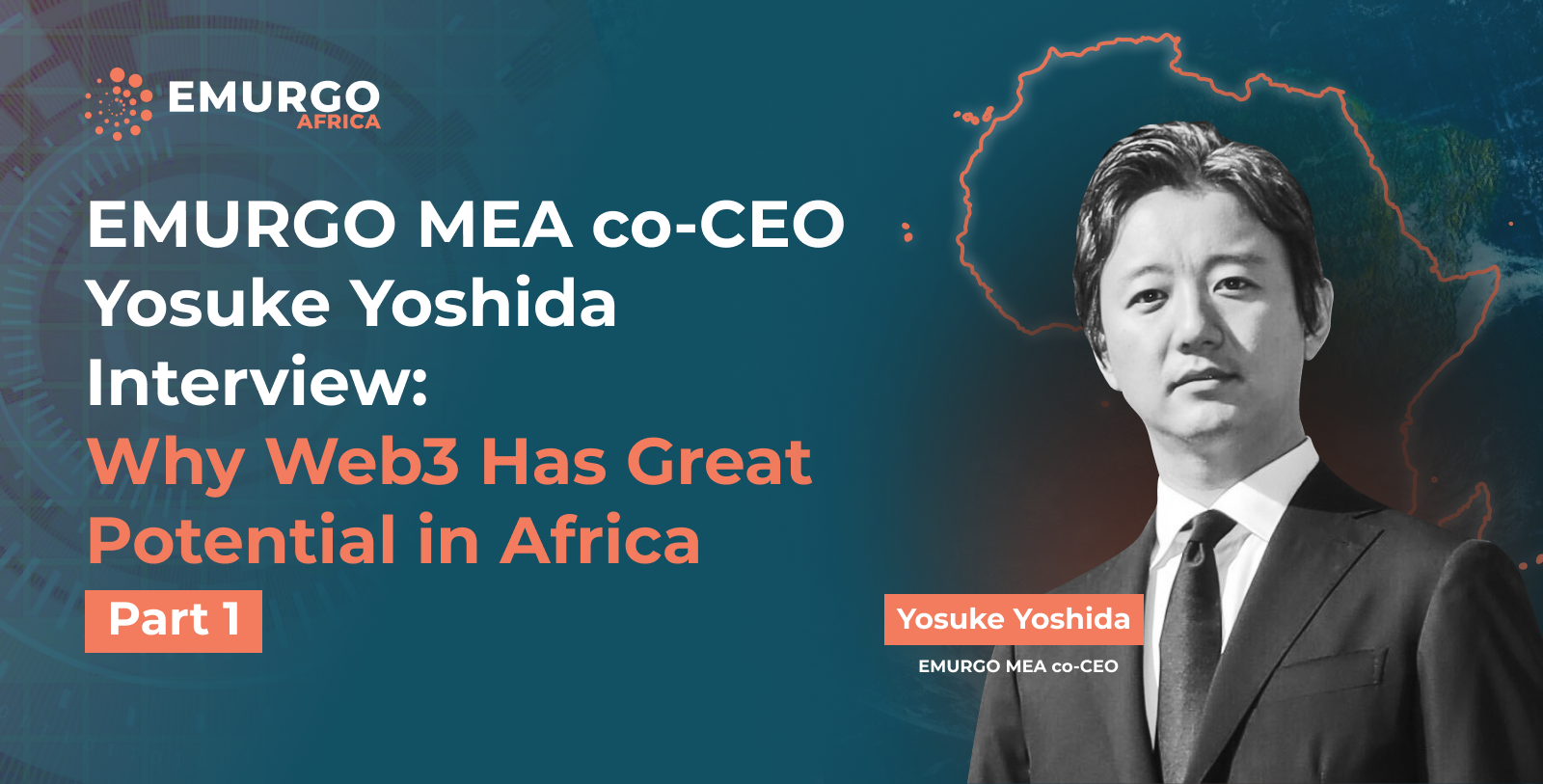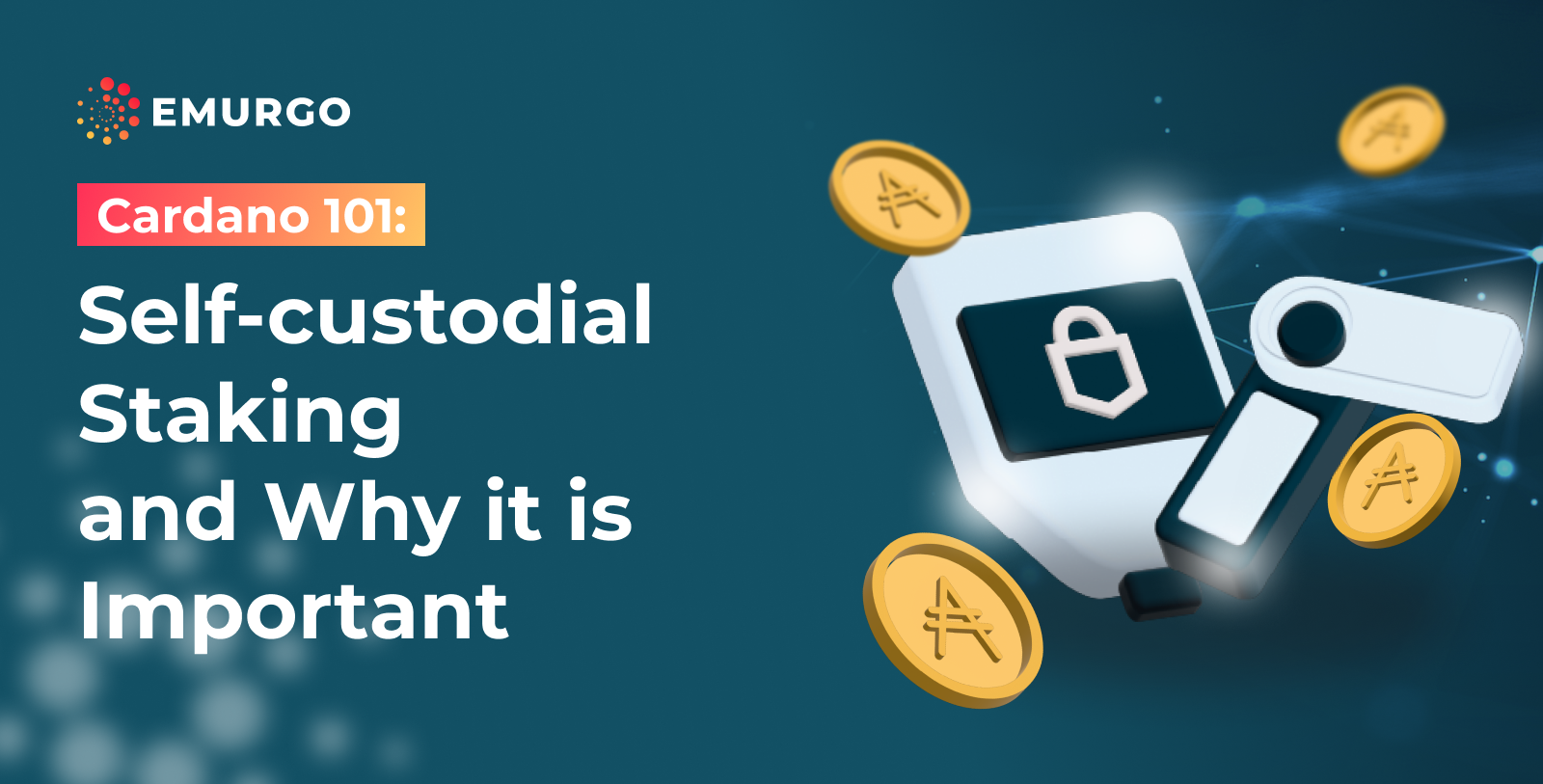**This original JP article has been translated, edited, and reposted into English here for viewing purposes only. The original interview can be accessed here.
By Satoshi Shinada
(Interviewer: Ryo Hasegawa)
In August 2022, Kepple Africa Ventures announced a strategic alliance with EMURGO Africa to explore investment opportunities in Africa’s growing Web3 space.
In this issue, we invited Yosuke Yoshida, EMURGO Middle East & Africa co-CEO to discuss the potential of Web3 in Africa.
Why do crypto and blockchain have more potential in emerging countries than in developed countries? What are the strengths that Web3 VCs can bring to Africa? What are the challenges that the African startup ecosystem must overcome? Our two-part interview will discuss the real current challenges and details of projects for the future, along with specific examples.
Why Web 3.0 has great potential in Africa
I am Satoshi Shinada, who runs the venture capital firm Kepple Africa Ventures.
We started investing in Africa at the end of 2018 and I am based in Nigeria, basically focusing on West and North Africa.
We are currently running a second fund, which has already started investing, and we plan to close it by the end of the year at a scale of 10 billion yen (USD 78 million).
Through the first and second funds, we have invested mainly in Web2-oriented startups in Africa, and 14 out of the 103 companies we invested in were Web3-related or had business models that could grow significantly with the help of Web3.
In other words, 15% of our investments were Web3 or crypto-related without us even being aware of it.
In African business, the term “leapfrog” is often easily associated with a set of words.
The reason for this is that the term is used in the sense of leapfrogging existing infrastructure in Africa, as there is no infrastructure in place, to begin with.
In reality, however, I think it is more accurate to say that startups are rebuilding the infrastructure.
Web3 and blockchain technology will allow direct connections between consumers and service providers in business areas that had previously been modeled by Web2 platformers.
Or in Africa, where traditional fiat currencies are depreciating rapidly, crypto is becoming very popular. In that sense, the potential of Web3 in Africa is huge.
Interview Q&A with EMURGO Middle East & Africa co-CEO Yosuke Yoshida and Satoshi Shinada

Q: Yoshida, please introduce yourself.
Yoshida: Hello. I am Yoshida from EMURGO Middle East & Africa. Like Shinada-san, I originally worked for a trading company for 15 years after graduating, mainly in M&A, specifically in South East Asia, acquiring overseas energy companies and being involved in the construction of power plants. While I was beginning to see the future and great potential of blockchain about five years ago, I had a chance to meet the founding members of Cardano, a Layer 1 blockchain, and joined EMURGO, one of its founding entities.
Q: Before we get into specifics, could you first give us a summary of the general situation of Web3 in Africa to get an overall sense of the situation?
Shinada: Nigeria, where I live, is a country with a particularly depreciating currency, and normally everyone wants to avoid the depreciation of their currency by buying dollars and other hard currencies. However, since they are hard to get hold of, the number of people buying cryptos has increased enormously.
As of 2021, research shows that 32% of Nigerians have used or held cryptos. Of course, global cryptocurrency exchanges such as Binance have a presence, but local exchanges have also increased after 2020 and are now a mixed bag.
As the movement to buy dollars through cryptos spreads, it will inevitably become harder to control the exchange rate. Therefore, although the government is tightening regulations, the reality is that crypto can be traded on a peer-to-peer (P2P) basis, so the excitement of crypto continues unabated.
However, with cryptos in such decline, people are beginning to look at longer-term asset-building strategies.
There is a movement to connect to DeFi which is linked to USD Coin (USDC), which is itself linked to the US dollar and offers a stable interest rate, as well as to DeFi that exists outside of Africa. The value of using cryptos as a means of long-term, stable asset building, rather than merely speculative trading, is highly anticipated.
Another major social background unique to Africa is the high unemployment rate.
Many people working in Africa are “gig workers,” or sole proprietors such as Uber drivers, mobile money agents, and various other forms of freelance work. As Uber and Bolt become more and more like essential infrastructure, the dependence on these platforms will only strengthen, and the gig workers who work for them will continue to be exploited. This is not a healthy situation.
To empower them, we need a system that connects service providers and users on an equal and direct basis. I believe that a business model based on Web3 is the way to create such a mechanism. That is why it makes sense to invest in Web3 businesses, and by extension, startups, in Africa.
Q: So, of all the technologies that Web3 encompasses, do you see a strong crypto element in Africa?
Yoshida: The precondition for this is “Web3” and “blockchain” are almost synonymous, and we have no problem using them in the same way. On the other hand, “crypto” is only one part that is encompassed within those concepts, although it plays a large role.
EMURGO’s position is based on the user adoption of Cardano as a Layer 1 blockchain and the expansion of its ecosystem, which is the premise of our investment and advisory activities. So we don’t necessarily have to be involved in crypto. We do not necessarily need crypto to be involved in this. I hope that today’s discussion is also not limited to crypto, but can be expanded to the context of blockchain.
First of all, it is estimated that 1% or about 900 billion yen (~ USD 7 billion) of the 90 trillion yen (~ USD 700 billion) of capital flowing into the global VC industry as a whole is invested in Africa.
Of that 900 billion yen, last year’s data showed that around 2%, or JPY 18 billion (~ USD 140 million), was invested in the blockchain space.
Therefore, depending on how you look at it, some people may say that we are addressing a minor niche in Africa, where business hurdles are high, but of course, we have our own perspectives and goals.
As Shinada explained at the beginning, we believe that the range of solutions and improvements that can be made with blockchain in Africa is far greater than in developed countries such as Japan and the US.
One clear example is a Web3 project that is using blockchain to bring more transparency to property registration. In Japan, double registration of real estate is rarely recognized as a day-to-day problem, partly because it is managed by the Legal Affairs Bureau.
This is not the case in Nigeria.
For example, an acquaintance of mine who owns property in Nigeria said that he had sold a property and had all the contracts. But he still was not 100% sure if he had owned and sold the property until the moment he had signed the final contract and the money arrived in his bank account.
In other words, when you decide to sell property, someone else can come along with a similar contract saying that they are also the owner. These problems with double registration can occur in real life.
This problem is just one example, but I think you can see why the scope for problem-solving in Africa by taking advantage of blockchain’s transparency and tamper-resistant properties, is far greater than in developed countries.
Shinada: What I emphasized earlier was the part of replacing existing platforms based on smart contracts, which does not necessarily have to require crypto. Of course, when the system changes to one based on smart contracts, crypto may be used as the main currency as a result. The important part is that there needs to be a social use case to move to a Web3 system. We believe that this is where the Web3 business model is being built to replace existing platformers.
Q: Even if we refer to “Africa” as a single region, the circumstances in relatively developed regions such as Egypt and Kenya are completely different from those in underdeveloped West Africa. Do investment strategies vary depending on the differences between African countries?
Yoshida: First of all, it is said that there are six countries in Africa as a whole where crypto is legal, including Kenya and Botswana. Conversely, there are also countries where it is banned.
And in the majority, about 80% of the countries, it has not swung either way and the regulations are not set in stone. Businesses are emerging, but national policies are not fully defined. Of course, this is not only in Africa, but it is still the case worldwide. So, in the case of projects involving crypto, it is necessary to proceed with the project while adjusting to the regulations of each country and obtaining the necessary licenses.
Shinada: Even if you take crypto and blockchain out of the context, West Africa is still often prejudiced as a difficult place to invest. Originally, oil resources attracted foreign investment, but areas such as general manufacturing and retail were difficult investment targets. Behind this is the image of widespread political corruption, and indeed this aspect cannot be dispelled. On the other hand, with the formation of the startup ecosystem in recent years, I feel that such a situation is improving.
When we invest in African startups, almost 90% of the companies we invest in have established parent companies abroad. We invest in these parent companies, and the actual operations are carried out by subsidiaries that hang on to the parent company. This way, we avoid a certain amount of regulatory risk.
In the past, as startups grew, there was a conflict with vested interest groups. This sometimes led to interferences from the regulator. Now this phase has ended and the situation is changing, with investment coming into startups from the periphery of vested interests. The fund we are managing is even receiving money from local pension funds and development finance institutions as LPs.
In other words, existing businesses and startup business models are beginning to connect financially, and we are seeing first-hand that the two worlds are beginning to merge.
As a result, we feel that in Nigeria, which is a huge market, start-up technology and the strengths of existing companies are complementing each other.
Q: What are your unique competitive advantages over global VC firms?
Yoshida: The crypto/web3 industry and the traditional financial industry have grown and expanded in separate worlds, so I think it is very valuable for players like Kepple to play a bridging role.
On the other hand, what makes us at EMURGO Middle East & Africa overwhelmingly different from the average VC firm is that we are supporting the most core technology in the Web3 industry – a globally recognized Layer 1 blockchain.
Support for portfolio companies is not limited to financial investment, but we can also provide advisory services on Cardano’s technical development.
(Stay tuned for Part 2 of this interview.)
About EMURGO Middle East & Africa
- Official Homepage: emurgo.africa
- Twitter: @EmurgoAfrica
- Telegram: https://t.me/emurgoafrica



